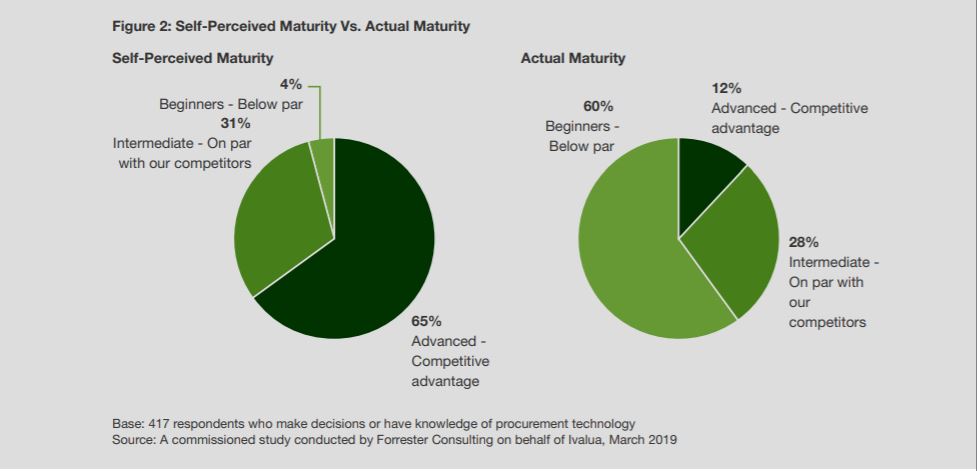Ivalua Named A Leader In The 2025 Gartner Magic Quadrant™ For Source-To-Pay Suites Report
View Report
Ivalua Named A Leader In The 2025 Gartner Magic Quadrant™ For Source-To-Pay Suites Report
View Report
Blog »
by Alex Saric
As we entered the new year, many of us no doubt set personal resolutions (64.6% of adult Americans according to a recent survey). Lose a few pounds. Save a little more each month. We do the same at work, typically in the form of MBOs. For Procurement leaders, that typically translates into saving a few percent here. Improving efficiency by some level. And so on.
At a personal and professional level, this is all well meaning and generally useful. But such goals have a problem. That problem is a typical lack of ambition, a missed opportunity. And that comes from the incremental nature of objectives. We love incremental objectives. They are usually measurable, readily acknowledged as achievable, and perhaps most significantly, we know what we have to do to meet them. Good reasons, but they cause us to miss bigger opportunities.
For Procurement leaders today, those missed opportunities can be great. Businesses, and our world, face tremendous challenges and uncertainty today, from the disruption of entire industries to the potentially catastrophic impact of climate change to the painful toll of forced and child labor. Take your pick from these or from a long list of other issues. How businesses spend has the potential to not just transform the business, but our world. This is especially true for large enterprises. Single companies carry such weight that their approach can have global ramifications. Our approach can mitigate, if not solve, many of today’s most pressing problems.
There are certainly companies that are already leveraging how they spend to transform the world, or planning to do so. Ikea is a leader with plans to ensure a sustainable supply chain. But for the most part, Procurement objectives remain too incremental rather than transformative.
This is a shame not just for the social benefit. Businesses need not abandon or compromise shareholder value in most cases. Many changes can reduce costs or reduce risk at the same time as delivering improved CSR. And with consumers increasingly looking to brands to align with their own values, brand equity can be greatly increased by thoughtful spend management and supply chain policies.
So how can Procurement leaders drive such change? A few tips that I’ve seen being common at the most transformative companies:
Digitization of Procurement and supply chain is an area that is ripe for incrementalism. Let’s onboard a few more suppliers, digitize a couple more processes, bring more spend into a platform, etc. It also does not seem as something that will necessarily change the world. More like a way to improve efficiency somewhat and bolster the bottom line. But it is a critical foundation. It frees capacity for being more strategic, improves decision-making, and in some cases can drive meaningful social benefit.
Take the U.S. Healthcare industry, for example. Persistent and unsustainable cost increases are threatening the public health, and consuming budget that could be directed towards infrastructure, education or other worthy goals. The massive paperwork and inefficiency also reduces the time staff has to treat patients, impacting the quality and availability of care. Innovative hospitals such as Baylor Scott & White Health are leveraging digitization as a key strategy to address these challenges, freeing caregivers to focus on patients and reigning in unsustainable cost increases. They will discuss their approach at the U.S. version of Ivalua NOW this May, along with Cleveland Clinic, another innovator. This benefits the public, the hospital’s finances and its staff.
The key is to be ambitious in digitization goals and realize 100% digitization across all spend, all suppliers and the full source-to-pay spectrum is both possible and essential. That is what drives transformative change. Recent studies by Forrester and Ardent Partners have shown that most companies struggle, with digitization generally being in the low-mid 30%. But leaders have achieved 100% – take CACI or Credit Agricole for example.

The organizations I see where Procurement is delivering truly strategic value consistently share one trait – Procurement engagement with the business. It is absolutely critical, to understand objectives and learn how spending and suppliers can be leveraged to achieve those goals. Ikea is supporting their global vision for a sustainable supply chain with board level alignment. Companies like Meritor are driving innovation and improved supply chain alignment by working closely with other departments. The big ideas, and the way to execute on them, rarely come from a silo. They need all stakeholders to be involved.
Big ideas require new ways of working. And who knows what the next big idea will be? The most innovative companies ensure they are agile enough to adapt over time. That relates to their talent – they seek change agents out. It relates to their processes, which need to evolve with the business. And it relates to their technology. The desire to achieve quick wins is natural and important to any transformation, but it shouldn’t come at a cost of future flexibility. Demand both.
To free caregivers to focus on patients, Baylor had to ensure their system didn’t just digitize office supplies, but also the unique workflows involved in operating room supplies. With a rigid, generic system, the most critical processes could never have been digitized, delivering incremental but not strategic value. Sprint’s idea to maximize revenue on used handsets by running mass volume forward auctions using their sourcing technology may not be transforming the world, but it certainly is transforming the business, having generated over $1B in annual revenue.
It would not have been possible if their sourcing technology was too rigid to meet the scalability requirements for such volume and the unique processes involved in running forward auctions. The President of JLL’s digital business will be delivering a keynote to the mostly Procurement audience at Ivalua NOW in Washington DC on how to rethink how business gets done, and how JLL’s spend and spend management technology is a cornerstone to their own strategy.
The leaders changing how business gets done select the team, processes and technology that ensures agility to meet unique or changing requirements when they arise and to bring their great ideas to life.
So let’s make 2020 the year that Procurement transforms your business, and beyond, at your organization. It’s not easy, but nothing worthwhile is. The world needs us – let’s not let everyone down.

Alex has spent over 15 years of his career evangelizing Spend Management, shaping its evolution and working closely with hundreds of customers to support their Digital Transformation journeys. As CMO at Ivalua, Alex leads overall marketing strategy and thought leadership programs. Alex also spent 12 years at Ariba, first building and running the spend analytics business as General Manager. He then built and led Ariba’s international marketing team until successful acquisition by SAP, transitioning to lead business network marketing globally. Earlier, Alex was a founding member of Zeborg (acquired by Emptoris)where he developed vertical Procurement applications. He began his career in the U.S. Cavalry, leading tank and scout platoons through 2 combat deployments. Alex holds a B.S. in Economics from the U.S. Military Academy at West Point and an international M.B.A. from INSEAD.
You can connect with Alex on Linkedin